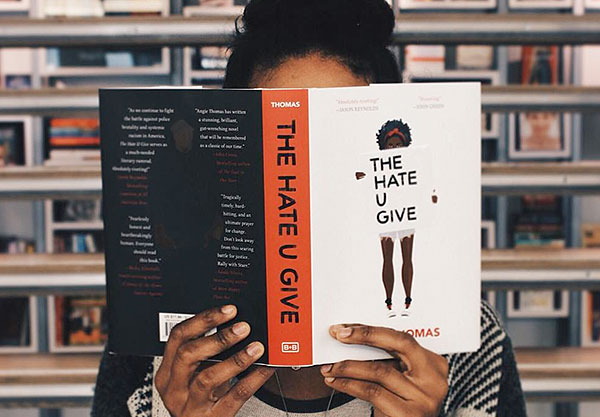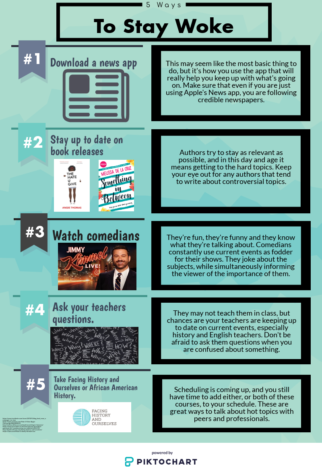SHS: keeping it real

“The Hate U Give” has English 11 Honors students mesmerized by its plot.
February 6, 2018
“Urban Dictionary” defines “stay woke” as “[keeping] informed of the [whirlwind] going on around you in times of turmoil and conflict, specifically on occasions when the media is being heavily filtered.” It is trying times such as these which require us to stay woke. At Solon High School, we are lucky enough to have a staff dedicated to this very task.
This year, SHS implemented various modes to teach current events—most prominently, Facing History and Ourselves (Facing History) taught by Karen Smith and African American History taught by Aaron Jeter. English 11 Honors also introduced current topics with the introduction of their Socratic Seminar focusing on anxiety and book selection of “The Hate U Give” by Angie Thomas.
Last year, the English 11 Honors teachers replaced one of their seminars with a fake news seminar, because that is what was relevant. This school year, they replaced a transcendentalist seminar with the anxiety seminar, because that was relevant this year–notice how they updated it to be current.
Despite the topic change, the seminar’s purpose remained intact. Students still made an annotated bibliography and did required research, but having such a “fresh” topic made them more motivated to do well.
 The truth of the matter is when teachers focus on what the students prefer, they will be able to see better results.
The truth of the matter is when teachers focus on what the students prefer, they will be able to see better results.
“Kids that never spoke before were talking about issues that they had in their personal lives,” said English 11 Honors teacher Jennifer Buemi.
These connections are what teachers strive for, and a cooperative learning environment benefits both instructors and pupils. In fact, when you actually ask the students what they want to learn, they’ll give serious, passionate answers.
“In all grades there should be [more] current event [assignments] that we should do or read, it just feels like a better learning experience in addition to the classical novels that we read,” said junior and English 11 Honors student Alixandria (Lexi) Joliat.
And this is why “The Hate U Give” was a great choice. It delves into what is happening today with police brutality and the Black Lives Matter movement, while still meeting reading requirements. Although it does not contain the same rhetoric or symbolism as the classics, it is arguably more important because it teaches about the real world.
Then again, most worry that these sensitive subjects could cause uncomfortable tension between students, but Facing History proved otherwise.
“[It was] an open classroom, and [we] were able to speak whenever we wanted, and [Smith] was able to let us say what we wanted to say, when we wanted to say it, and speak our minds,” said senior and previous Facing History student Julian Broderick.
Other teachers can create safe spaces too, as the English 11 Honors teachers demonstrated. Buemi said that the students were offered a book other than “The Hate U Give–”whether they were uncomfortable with the language, or the topic itself– that still held the same theme of injustice. Notably, none of her students chose to read it.
Teachers set out to make a fun and engaging environment for their students. Making sure they are talking or at least enjoying the course is what is most important, and African American History along with the other classes have done just that. Additionally, Senior and former African American History student Sydney Black said that the class was entertaining. From the students to the music that Jeter played, it was a happy environment.
“We learn, but we also have fun learning, and at the end of every class we always walk away with something new to share with someone,” Black said.
One reason current events aren’t discussed academically is because teachers spend months pre preparing lessons, and the news is always changing. But the beauty of having classes like Facing History and African American History is that their mission is to expand students knowledge of current activity by relating it to the past.
“My purpose is to [create] an environment for students to have a platform to express their ideas and ask questions to discuss topics that aren’t found in a current curriculum,” Smith said.
Other classes have standards which must be met for the teachers’ sakes, seeing as if their students do not meet certain testing standards, it reflects poorly on the teacher, which is why teaching the real world is hard to fit into the budget. So rather than adding more courses, I propose that we tailor the offered courses to be more current event oriented. When students graduate high school, the news will most likely be how they stay connected with the outside world. By introducing news to younger kids, they will read it more in the future.
Even if there is no socratic seminar in the lesson plan, essay prompts can be made about current events, or news articles can be used to talk about tone. Almost every student takes English at SHS, so this is one of the best places to teach current events, but relating something present to history can just as easily be done.
Students are constantly being inundated with work, which doesn’t leave much time for the finer things in life, which–unfortunately–includes the news, so in order to ensure that youth is not segregated from the outside world, why not just add it to the curriculum instead?
